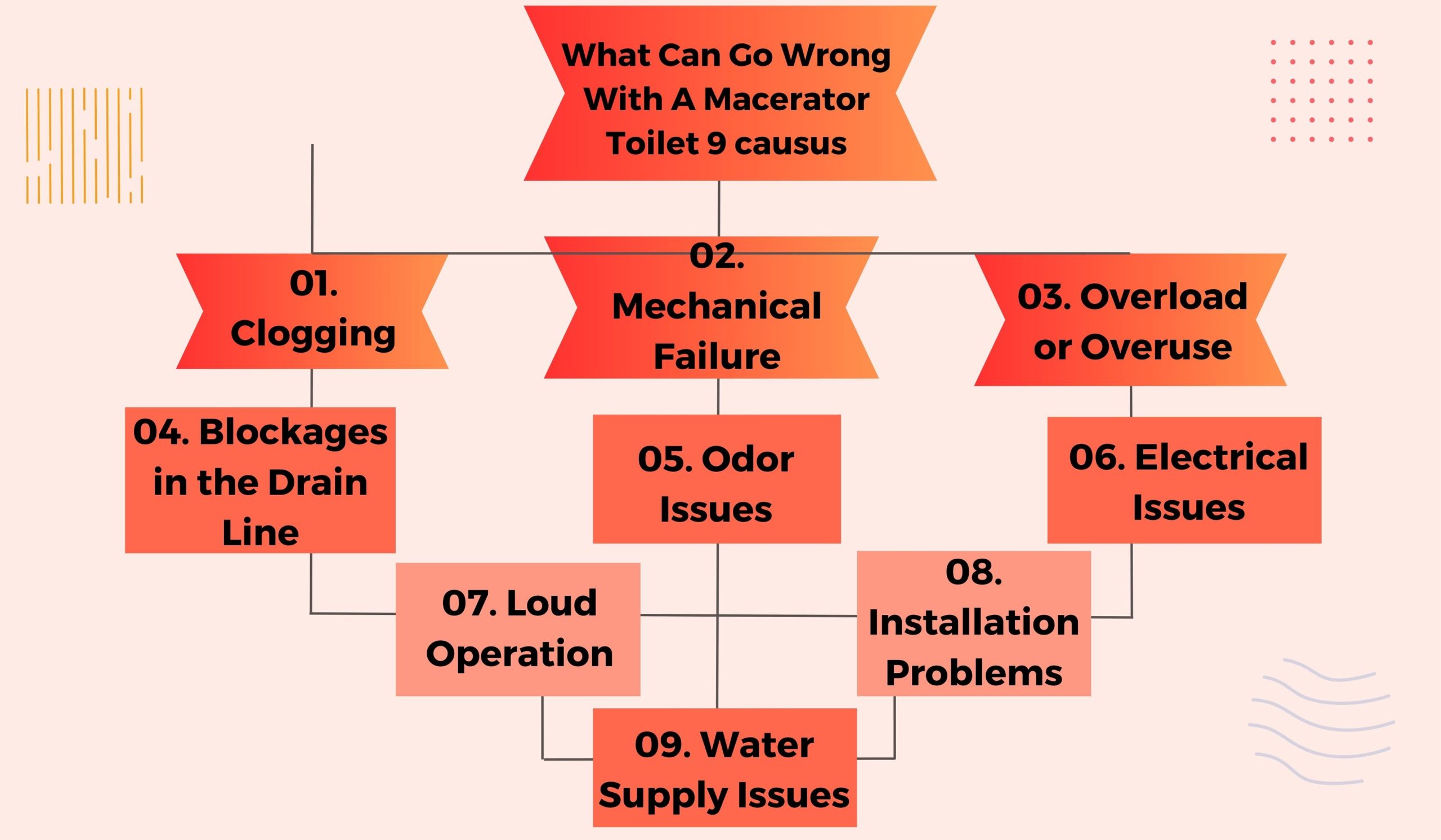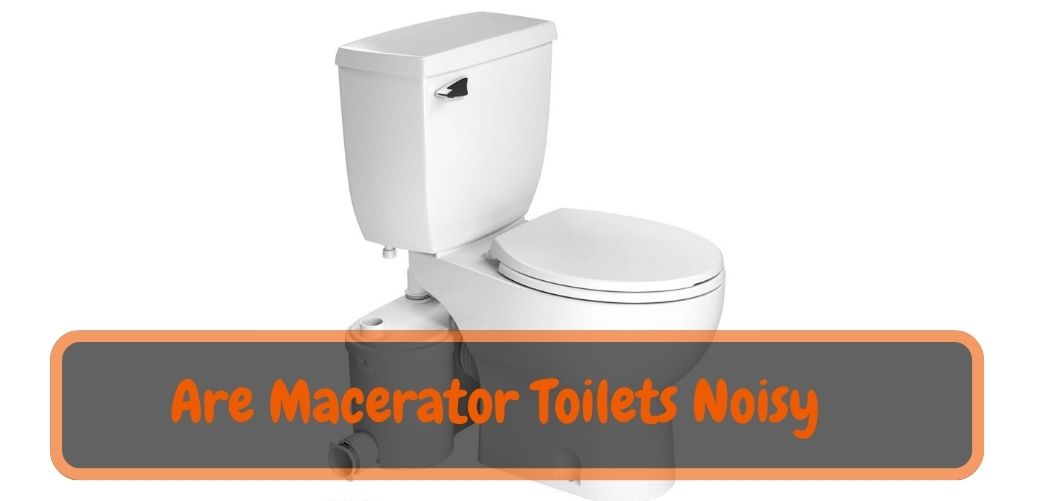A macerator toilet is a type of toilet that uses a macerator pump to grind waste into a fine slurry, which can then be pumped through small-diameter pipes. While macerator toilets can be convenient in certain settings, there are several potential issues that can arise:
01. Clogging:
Macerator toilets can clog if inappropriate items are flushed down the toilet. Items like sanitary products, baby wipes, paper towels, or anything other than toilet paper can cause clogs in the macerator pump or the plumbing system.
02. Mechanical Failure:
Like any mechanical device, macerator pumps can experience malfunctions or failures over time. Components such as blades, motors, or seals can wear out, leading to the pump not functioning properly or making unusual noises.
03. Overload or Overuse:
Macerator toilets have a limit to the amount of waste they can effectively process in a single flush. If they are consistently overloaded or used more frequently than recommended, the macerator pump may become overwhelmed and fail.
04. Blockages in the Drain Line:
The small-diameter drain pipes used in macerator toilet systems can get blocked by accumulated waste, debris, or mineral deposits. This can cause the system to back up or not drain properly.
05. Odor Issues:
If the macerator pump or the plumbing system is not properly sealed, foul odors from the waste can escape into the living space. Proper installation and maintenance are crucial to prevent this problem.
06. Electrical Issues:
Macerator toilets rely on electrical components to operate, and any electrical issues such as wiring problems, short circuits, or power outages can disrupt the functioning of the macerator pump.
07. Loud Operation:
Some macerator pumps can be quite noisy during operation, which can be bothersome to occupants, especially in close living quarters.
08. Installation Problems:
Incorrect installation or improper connection of the macerator toilet system can lead to various issues, including leaks, inefficient operation, or other plumbing problems.
09. Water Supply Issues:
Problems with the water supply, such as low water pressure or interruptions, can affect the flushing and operation of the macerator toilet.
Regular maintenance, proper usage, and following the manufacturer's guidelines for operation and maintenance can help minimize the risk of these issues and prolong the life and efficiency of a macerator toilet. If you encounter persistent problems, it's advisable to consult a professional plumber for repairs and maintenance.
Also Read: Unlocking the Mystery: How Big is a Macerator Toilet ?
Do Macerator Toilets Need Maintenance?
Yes, macerator toilets do require regular maintenance to ensure they function properly and remain in good condition. Here are some maintenance tasks typically associated with macerator toilets:
1. Regular Cleaning:
Like any other toilet, macerator toilets need regular cleaning to prevent buildup of grime, odors, and potential clogs. Clean the bowl, macerator unit, and any visible components using mild cleaners and non-abrasive cloths.
2. Inspect and Clear the Macerator Unit:
Periodically inspect the macerator unit for any obstructions or debris that could impede its functioning. Remove any foreign objects, toilet paper, or other materials that may have accumulated in the unit.
3. Check for Leaks:
Inspect the macerator toilet for any signs of leaks, such as water pooling around the base or unusual sounds. Address any leaks promptly to prevent water damage and maintain the toilet’s efficiency.
4. Maintain the Blade:
The blades in the macerator unit are essential for breaking down waste. Check the blades for signs of wear or damage. If needed, replace or sharpen the blades according to the manufacturer’s instructions.
5. Flush the Macerator Regularly:
Run the macerator with water periodically (following manufacturer guidelines) to help keep the system lubricated and prevent any buildup of waste or debris.
6. Use Appropriate Products:
Use toilet paper that is labeled as safe for use with macerator toilets. Avoid using products that can easily clog the system.
7. Follow Manufacturer Instructions:
Always follow the manufacturer’s recommended maintenance guidelines and schedule. This will ensure that you’re taking appropriate measures to keep the macerator toilet in good working order.
8. Annual Professional Inspection:
Consider having a professional plumber or technician inspect the macerator toilet annually to identify any potential issues and perform any necessary maintenance or repairs.
Regular maintenance and proper use of a macerator toilet can extend its lifespan and prevent costly repairs or replacements down the line.
Also Read: Why is Macerator Toilets are Blocked: Easy Guide to Know!
Potential Issues that Can Occur With a Macerator Toilet
Here’s a table of potential issues that can occur with a macerator toilet:
| Issue | Description |
|---|---|
| Clogs and Blockages | Accumulation of debris, foreign objects, or excessive toilet paper can obstruct the macerator unit or pipes. This can result in slow drainage or complete blockage. |
| Loud or Unusual Noises | Excessive noise during operation may indicate blade issues, obstructions, or motor problems within the macerator unit. |
| Leaking or Water Pooling | Leaks around the base of the macerator toilet can occur due to damaged seals, loose connections, or issues with the macerator pump. |
| Blade Problems | Dull or damaged blades can lead to inefficient waste maceration, causing clogs, blockages, or increased noise levels. |
| Pump Malfunctions | The macerator pump may fail to work properly due to electrical issues, motor problems, or pump failure, resulting in ineffective waste disposal. |
| Unpleasant Odors | Improper maintenance, inadequate cleaning, or a malfunctioning macerator unit can contribute to foul smells emanating from the toilet or macerator system. |
| Electrical Issues | Problems with the electrical components, wiring, or power supply can disrupt the functioning of the macerator toilet, leading to operational failures. |
| Drainage Problems | Macerator toilets may experience difficulties in effectively pumping and draining waste, often caused by pipe blockages, pump issues, or inadequate flushing. |
| Seal Degradation | Over time, seals within the macerator unit can deteriorate, causing leaks and reducing the unit’s efficiency in breaking down waste. |
| Improper Use of Toilet Paper | Using excessive or non-macerator-friendly toilet paper can overwhelm the system, leading to clogs and other issues. Educating users on proper toilet paper usage is essential. |
Regular maintenance, timely repairs, and proper usage can help mitigate these issues and keep a macerator toilet functioning effectively.
Also Read: How to Use a Macerator Toilet: Tips and Tricks!
FAQ: Macerator Toilet Maintenance and Troubleshooting
1. Q: Why is my macerator toilet making a loud noise?
A: Loud noises from a macerator toilet could indicate an issue with the blades or an obstruction. Check and maintain the blades, and inspect for any foreign objects in the macerator unit.
2. Q: How can I clean a macerator toilet?
A: Regularly clean the macerator toilet using mild cleaners and non-abrasive cloths. Ensure the macerator unit and toilet bowl are free of grime and buildup to prevent potential clogs and odors.
3. Q: What should I do if my macerator toilet is draining slowly?
A: Slow drainage in a macerator toilet may result from clogs or obstructions. Inspect and clear the macerator unit and associated pipes, ensuring there are no blockages hindering proper drainage.
4. Q: How can I repair a macerator toilet pump that is not working?
A: If the macerator toilet pump is not working, check for power supply issues, blown fuses, or tripped circuit breakers. Additionally, inspect the pump for any damage or malfunctions and consider professional repair if needed.
5. Q: Do macerator toilets make noise during operation?
A: Yes, macerator toilets typically produce some noise when in operation due to the grinding of waste by the macerator unit. However, excessively loud or unusual noises may indicate a problem that needs attention.
6. Q: What steps can I take to address a noisy macerator toilet?
A: If your macerator toilet is excessively noisy, ensure the blades are in good condition and the unit is free of any obstructions. Regular maintenance and proper use can help reduce noise levels.









